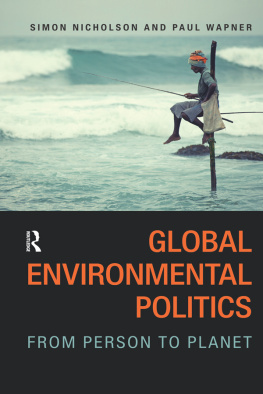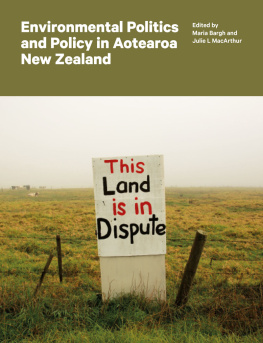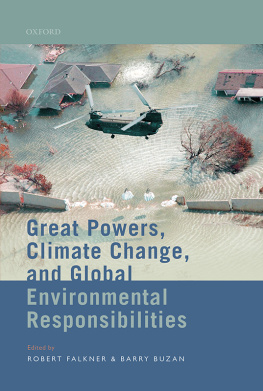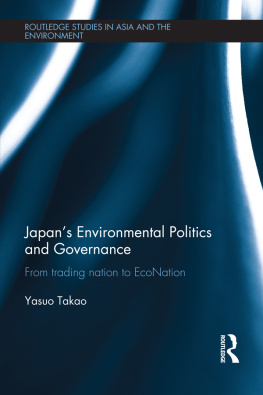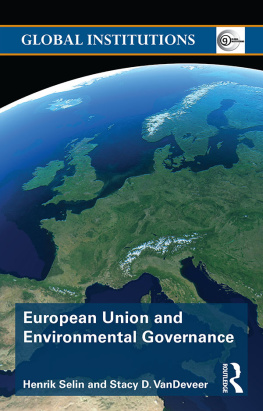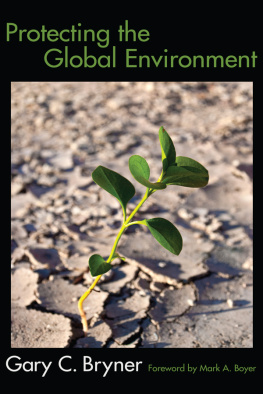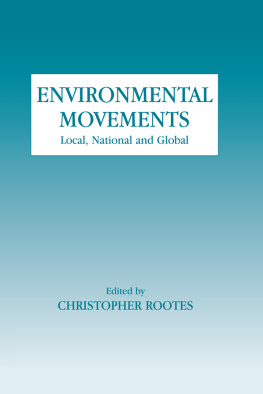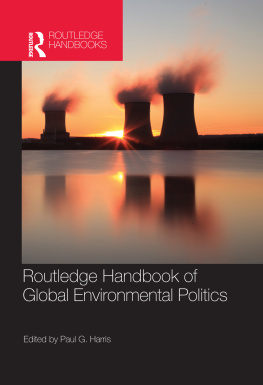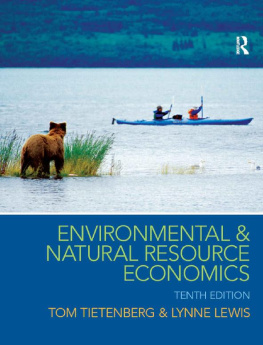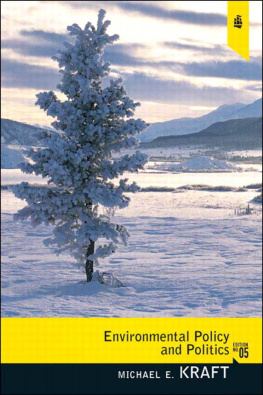First published 2015 by Paradigm Publishers
Published 2016 by Routledge
2 Park Square, Milton Park, Abingdon, Oxon OX14 4RN
711 Third Avenue, New York, NY 10017, USA
Routledge is an imprint of the Taylor & Francis Group, an informa business
Copyright 2015, Taylor & Francis.
All rights reserved. No part of this book may be reprinted or reproduced or utilised in any form or by any electronic, mechanical, or other means, now known or hereafter invented, including photocopying and recording, or in any information storage or retrieval system, without permission in writing from the publishers.
Notice:
Product or corporate names may be trademarks or registered trademarks, and are used only for identification and explanation without intent to infringe.
Library of Congress Cataloging-in-Publication Data
Global environmental politics: from person to planet / edited by Simon Nicholson and Paul Wapner.
pages cm
Includes bibliographical references.
ISBN 978-1-61205-648-7 (hardcover: alk. paper)ISBN 978-1-61205-649-4 (pbk.: alk. paper)
1. Environmental policyPolitical aspects. 2. Environmental protectionPolitical aspects. 3. Environmental protectionInternational cooperation. I. Nicholson, Simon (Simon James) editor of compilation. II. Wapner, Paul Kevin, editor of compilation.
GE170.G567 2014
363.70561dc23
2014018921
ISBN 13: 978-1-61205-648-7 (hbk)
ISBN 13: 978-1-61205-649-4 (pbk)
For
Liam & Julien
and
Eliza & Zeke
Contents
Part I
State of the Planet
Elizabeth Kolbert
Charles C. Mann
Alex Steffen
Bill McKibben
Stephen M. Meyer
Maude Barlow
Lester Brown
Thomas Friedman
Bill McKibben
Erik Assadourian
John Tierney
Part II
States, Markets, and Society: Geopolitical Responses to Unsustainability
Jennifer Clapp and Peter Dauvergne
Paul Harris
Richard Falk
Peter Dauvergne and Jane Lister
Paul Krugman
Naomi Klein
Paul Hawken
Paul Wapner
Johann Hari
Herman E. Daly
Jonathan Rowe
Peter Singer
Anil Agarwal and Sunita Narain
Robert Bullard
Part III
From Person to Planet: Into a Livable Future
Donella H. Meadows
Michael F. Maniates
Paul Wapner and John Willoughby
Michael Pollan
Roderick Frazier Nash
Joanne Harris
Wendell Berry
Michael Shellenberger and Ted Nordhaus
Simon Nicholson
Paul Wapner
Barbara Kingsolver
This book is the result of more than two decades of teaching introductory courses in global environmental politics. During this time, we have learned from committed colleagues, benefited from working with remarkable students, and felt the deep joys of loving families. It is a pleasure to express our appreciation.
First, we want to thank the authors whose writings appear on these pages for producing such remarkable work. Their words offer penetrating insight into global environmental challenges and the world is better for their efforts.
Second, we are grateful to our colleagues in the Global Environmental Politics Program at American University and the Environmental Studies Section of the International Studies Association. You have provided steady intellectual friendship in the service of environmental protection, and this has afforded much light in an often-dark world. We would also like to thank our research assistants, Matthew Cannon, Chiara Guzzardo, Anne Kantel, Jonathan Waldrop, and Sijin Xian, for providing exceptional help in bringing this volume to fruition.
We owe a special debt to our students. While both of us enjoy research, our scholarship most takes flight in the classroom. Over the years, we have been challenged by our students to reflect on the most profound dimensions of global environmental politics and to develop accessible, coherent, exciting, and significant ways of presenting material. We are grateful to all who suffered through our presentations, participated in seminar discussions, and answered our most urgent questions with deeper lines of inquiry.
Jennifer Knerr, at Paradigm Publishers, has been a joy to work with. She saw the need for a compelling, fair-minded, and forward-looking text to apprentice students into the world of environmental challenges and skillfully shepherded it through the production process. We are grateful to her and her team at Paradigm for their tireless efforts in support of this volume.
Simon writes: I would like to acknowledge and thank my parents, Alison and Neville, and my sisters, Emma and Sarah, for their unyielding encouragement. I would also like to recognize the intellectual debt I owe to a string of great teachers, most notably Alexander Gillespie, Patrick Thaddeus Jackson, Anna Strutt, and my partner and collaborator on this book project, Paul Wapner, who I have the honor of calling a mentor and friend. I am blessed every day by the love and support of my wife, Anne-Claire, and my two sons, Liam and Julien. Fatherhood brings with it certain obligations, perhaps the most important of which is to work toward a future filled with possibility for ones children. I would like to dedicate this book to Liam and Julien in small service of such an end.
Paul writes: Since this book is primarily a teaching tool, it seems fitting to acknowledge key teachers in my life. Academically, my deepest gratitude goes to Richard Falk. Among many other things, Richard has taught me that meaningful scholarship must be in the service of creating a more just world. He has certainly demonstrated this in his work, and I strive to follow his example. From a different corner, Im grateful to Ram Dass, Mitchell Ratner, Jeff Warren, and the land and people of the Lama Foundation for helping navigate the more existential questions. I appreciate their guidance over the years. My greatest teachers are my family. Thank you, Diane, Zeke, and Eliza, for educating me into lifehood. Ive learned and continue to learn from your unique ways of being in the world and feel incredibly fortunate that you are the central animators of my life.
Introduction
Living in an Environmental Age
Each person reading this book is a unique individual, with particular likes and dislikes and a novel way of being in the world. At the same time, each is a living part of a much larger, interconnected whole that includes other people, species, and the elements. Reconciling these two identities sits at the heart of global environmental politics and represents the essential challenge of the twenty-first century.
Think for a moment about what it takes to live through a typical day in our lives. We all need to eat, work, share companionship, shelter ourselves, and, if were lucky, enjoy some entertainment. What is required to support these necessities and efforts? At a minimum, we depend on farmers to grow crops and transportation systems to get the food into our refrigerators. To create and run our computers, cell phones, and other gadgets, we need minerals, petroleum, and often coal or natural gas. To be clothed we need cotton and other fabrics and dyes, and these, like everything else, depend on adequate water, sufficient sunlight, moderate temperatures, ingenuity, and lots of hard work. Any casual look reveals that our lives depend on the functioning of a broad and complex social and biological tapestry.

